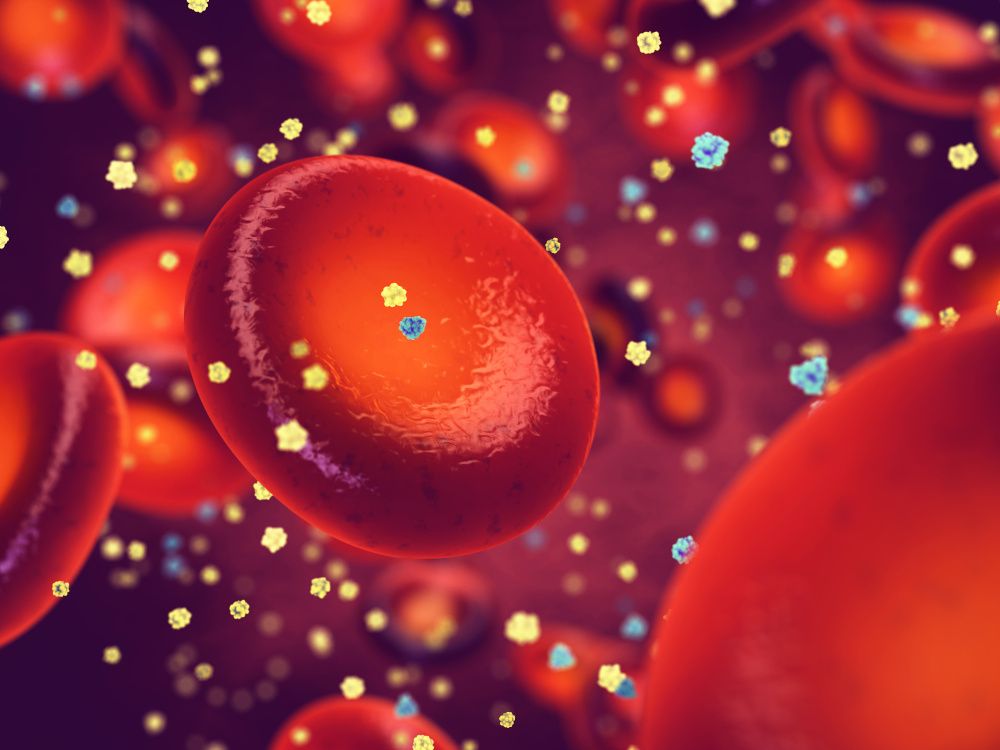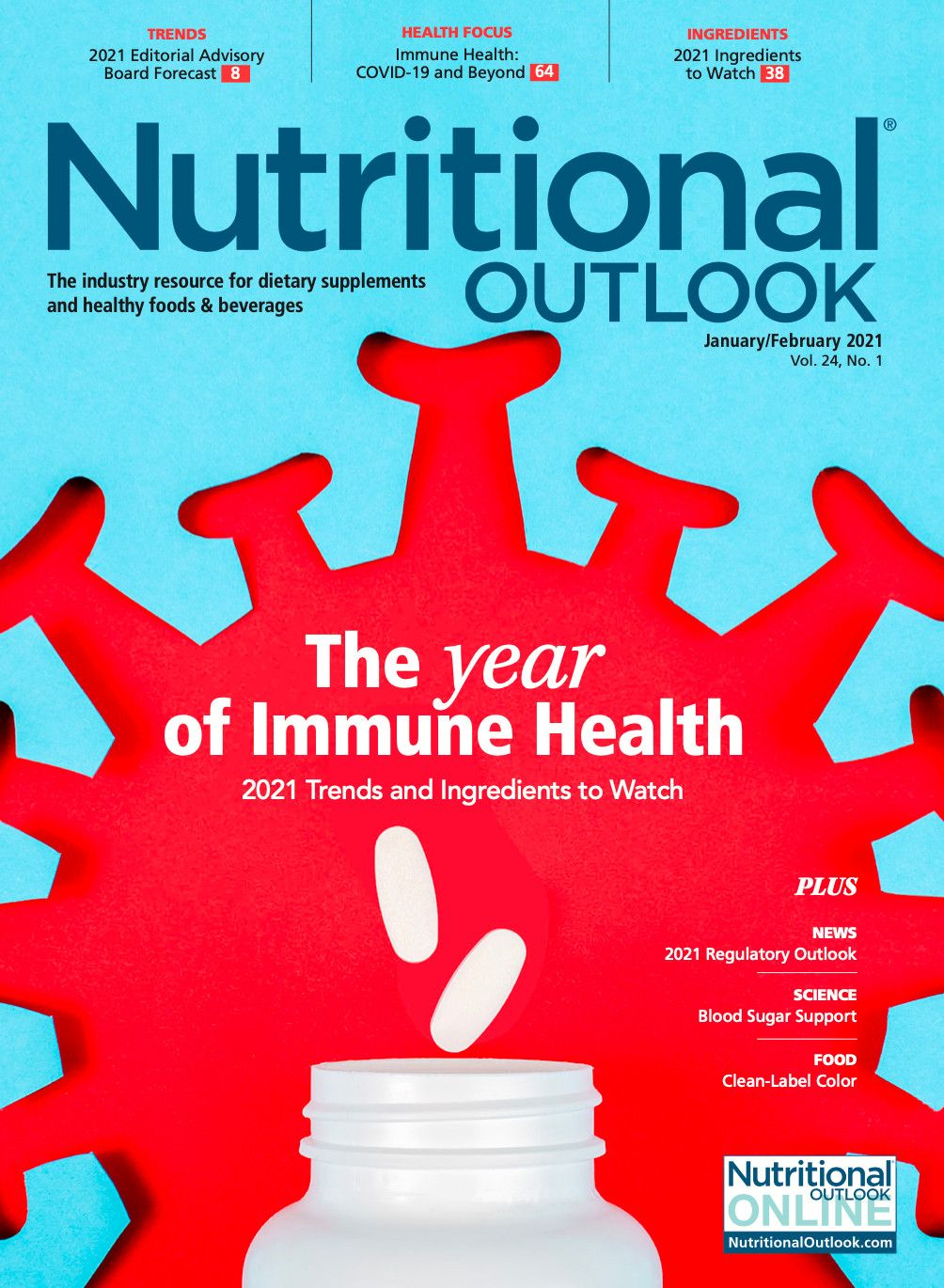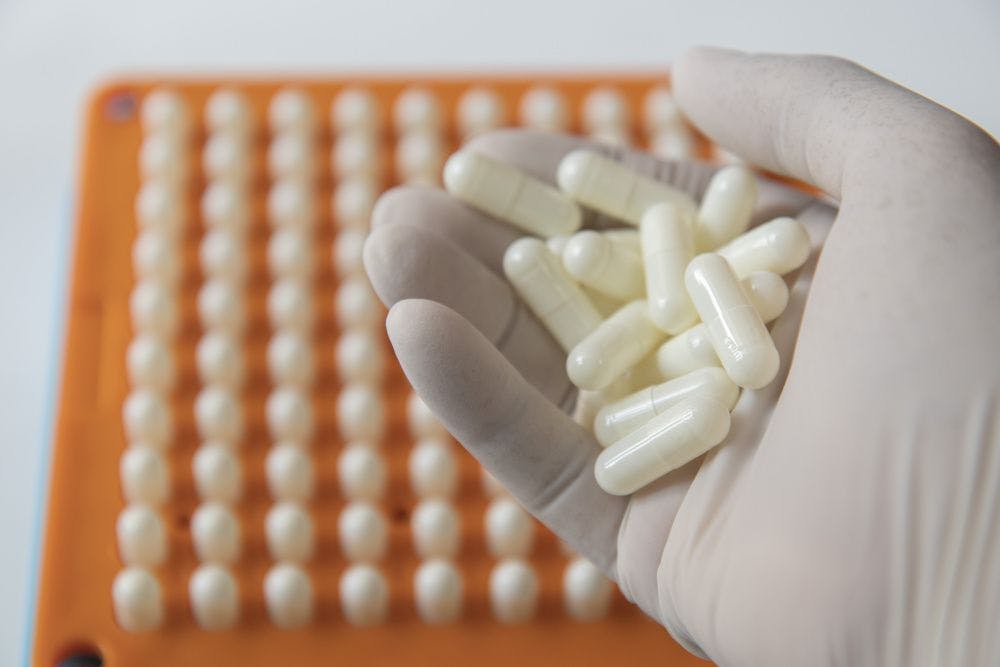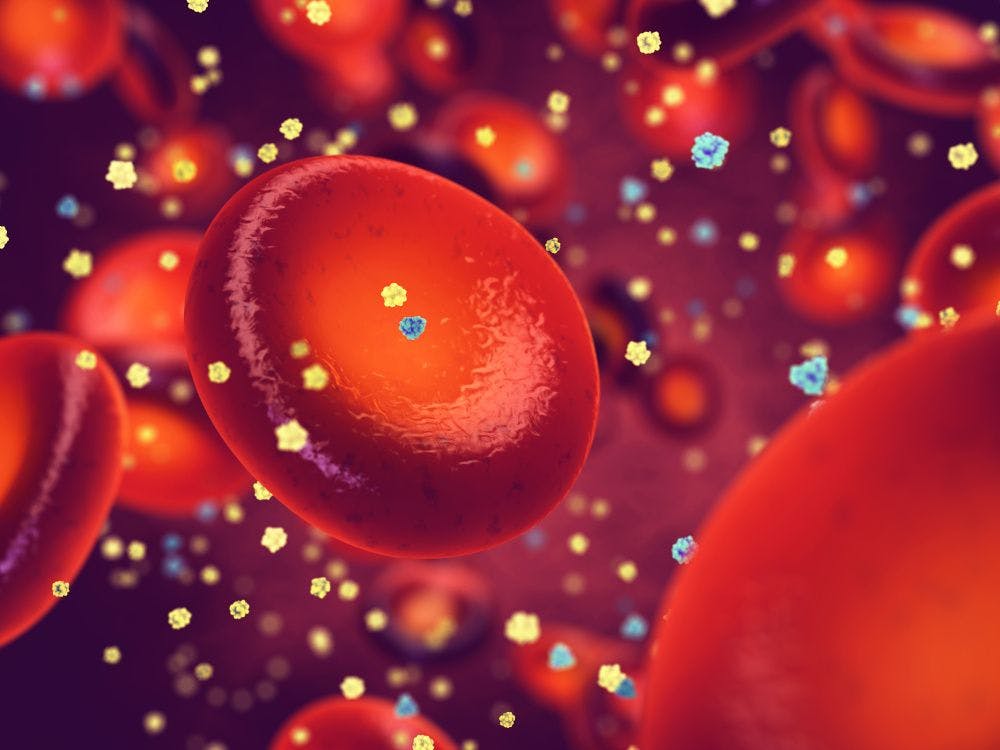Glycemic Giants: The latest research on ingredients for blood sugar support
New research is demonstrating which blood sugar support ingredients are effective and the different ways in which they work.
Photo © Nobeastsofierce - Stock.adobe.com

Blood sugar support is increasingly top of mind for consumers, for good reason. The Centers for Disease Control and Prevention estimate that just over 10% of Americans have diabetes, and another 33% have prediabetes.1 Consumers are more aware of the pathology, and 44% report a high degree of awareness of their sugar consumption, according to a 2019 FMCG Gurus survey of 26,000 respondents.2 Consumers are looking to not only cut back on their sugar intake but also to support healthy blood sugar levels.
The blood sugar market has seen an influx of new research as demand for reliable ingredients grows. Glucose-control ingredients with robust research will find ample opportunities. Ahead is a look at some of the ingredients that showed positive results in recent studies.
Fig Extract Improves Insulin Sensitivity in Mice
A recent animal study3 demonstrated the efficacy of fig fruit extract (Ficus carica L.) on glucose control. The study, carried out by the Nutritional Immunology and Molecular Medicine Laboratory (NIMML Institute; Blacksburg, VA) and Biotherapeutics Inc. (Blacksburg, VA), examined the effects of Euromed’s (Bridgeville, PA) ABAlife brand of fig extract on insulin sensitivity and glycemic control in obese and diabetic mice.
A group of 8- to 10-week-old mice bred in house by Biotherapeutics Inc. was assigned a high-fat diet, with 42% of their kilocalories coming from fats. A second group received standard rodent laboratory chow. The mice were randomly assigned to groups determined by their baseline weight and fasting blood glucose level, and the mice received either ABAlife dosed at 0.125 mcg/kg per day, or a matching vehicle control, for 12 weeks. Fasting blood glucose was measured at baseline after a four-hour fast, as well as four hours after a glucose-challenge test and two hours after an insulin-challenge test.
The study authors determined that ABAlife improved insulin sensitivity and glycemic control, resulting in lower blood sugar levels on an insulin-tolerance test. A 1g/kg glucose-tolerance test found that ABAlife resulted in a 40% decrease in both blood sugar spike and baseline return time.
Andrea Zangara, head of scientific communications and marketing for Euromed, says this study and a previous 2019 Phase I clinical trial in healthy adults4 support the clinical development of ABAlife and provide a strong foundation for Phase II trials in prediabetic human subjects.
Consumers, he says, are looking for earlier interventions and better preventive solutions for blood sugar support. “Today’s health-conscious consumers are taking well-being into their own hands with targeted nutrition,” he says. “Preparing for a longer, healthier life is a growing trend. Consumers want to stay fit and healthy for as long as possible, and they’re looking for natural and safe solutions that are backed by science.”
Fiber-Mineral Blend Promotes Glucose Homeostasis
While much research has been done on the beneficial effects of dietary fiber on glucose levels, a recently launched blend of prebiotic fibers and minerals is proving to be useful in regulating blood sugar. The branded fiber-mineral product WellBiome, launched in June 2020 by OptiBiotix (York, UK), is a blend of fructooligosaccharides, glucomannan, and chromium.
Steven Riley, director of marketing and consumer sales for OptiBiotix, says prebiotic and probiotic ingredients are seeing growth as interest in blood sugar control fuels additional research. “Identifying which pre- and probiotics are most likely to support or improve blood sugar levels is still ongoing,” Riley says. “Some researchers have been able to identify novel strains of probiotics that can replenish glucose control functions that are lost in the gut.”
One recent ex vivo study5 examined the effects of prebiotic ingredients on bioactive lipid production in both mice and humans. The study authors conducted post-mortem duodenal biopsies of both mice and of Caucasian men between the ages of 42 and 67 within 12 hours of their deaths.
The human subjects consisted of both diabetics who had received medical treatment for type 2 diabetes (n=5) and healthy subjects with no history of diabetes (n=5). The nine-week-old male mice had been fed either a high-fat diet (45% fat, 35% carbohydrates, 20% protein) or a high-fat diet plus 0.3 g/day of Beneo’s (Parsippany, NJ) Orafti brand of fructooligosaccharides (FOS). Additionally, in the final week of the study, the mice on the high-fat diet received 100 microliters of either the bioactive lipid 12S-HETE or the synthetic opioid peptide DAMGO via oral gavage, plus 1 mg/kg/day of GW9662 via injection.
The study authors found that mice on the high-fat diet that received FOS had lower fasting glycemic scores and lower spikes in insulin levels 15 minutes after oral loading of 3 g/kg of glucose compared to mice on the high-fat diet that did not receive FOS. The authors say their study shows that prebiotics act on gut microbiota to promote glucose homeostasis, although further study is required to clarify the mechanism of action.
Bergamot Extract Regulates Cholesterol and Hunger Hormones
New research is demonstrating the efficacy of polyphenolic flavonoids in regulating hormones that affect blood sugar and metabolism. HP Ingredients’ (Bradenton, FL) new, improved bergamot (Citrus bergamia Risso) formula, launched in 2019 and branded as Bergamonte, is a polyphenol extract complex containing flavonoids sourced from the bergamot tree.
Annie Eng, CEO of HP Ingredients, says a new clinical trial on the improved Bergamonte formula found various metabolic effects. “Researchers found the new Bergamonte retained its powerful ability to regulate cholesterol and blood glucose levels,” Eng says. “The study also found that Bergamonte [reduces] body weight.”
The new clinical trial found that a 650-mg dose of Bergamonte increased leptin by 12.3%, decreased ghrelin by 6.89%, and increased adiponectin by 18.65%. This effect was found to be dose-dependent; a 1300-mg dose of Bergamonte resulted in a 21.36% increase in leptin, a 14.9% decrease in ghrelin, and a 21.76% increase in adiponectin.
Eng says the blood sugar category is starting to take on a new shape. Products for blood sugar are no longer targeting isolated functions; rather, they are increasingly being positioned as multifunctional, addressing related metabolic health concerns and claiming to promote overall health.
Blackseed and Omega-3s Improve Fat Profile, Insulin Sensitivity
While various individual ingredients are proving to be effective at managing blood sugar, new research is demonstrating that some blood sugar ingredients have synergistic properties when combined. Morris Zelkha, CEO of TriNutra (Harrison, NY), says a prime example of a synergistic relationship between blood sugar ingredients is the relationship between omega-3 oil and black seed (Nigella sativa) oil.
In a recent animal study6, researchers assessed the effects of TriNutra’s branded black seed extract ThymoQuin and an omega-3 oil from GC Rieber (Bergen, Norway) on a group of eight-week-old male mice. All mice were randomly assigned to receive either a lean diet or a high-fat diet for eight weeks. The lean diet consisted of standard rodent chow, while the high-fat diet consisted of 42% dietary fats, 42.7% carbohydrates, 15.2% protein, and trace cholesterol. Additionally, the high-fat group was further subdivided into a high-fat control group, a high-fat plus 0.75% ThymoQuin group, a high-fat plus 2% omega-3 group, and a high-fat plus both 0.75% ThymoQuin and 2% omega-3 group.
After eight weeks, the mice were dissected. The study authors found that mice on a high-fat diet that received omega-3s had smaller lipid droplets than mice in the high-fat control group. Furthermore, the mice that received both omega-3s and ThymoQuin saw additional reductions in lipid droplet size relative to the mice that received only omega-3s. The effect of the thymoquinone/omega-3 blend was found to be dose-dependent. The study authors also found that administration of the ThymoQuin and omega-3 oil together increased biomarkers of insulin sensitivity.
ThymoQuin and omega-3 oil are being combined as a formula called Omega-3 Forte, a compound that promotes fat conversion. Zelkha notes that converting white fat into beige fat promotes whole-body energy metabolism and helps balance glucose and insulin levels. “Omega-3 Forte plays a pivotal role in the fat-conversion process,” he explains. “Because of this ingredient combination’s ability to target unhealthy fat, it also provides protection against obesity-induced oxidative stress.”
Flavonoids Promote Immune Health via Blood Sugar Modulation
The connection between blood sugar and immune health has gained renewed scrutiny in recent years, and it’s revealing a new opportunity for blood sugar–support ingredients that can also target the immune health market.
One Stanford University longitudinal study7 examining the connection between blood sugar and immune health followed a group of 55 women and 51 men between the ages of 25 and 75 for nearly four years. Blood samples were taken at baseline and once every three months as well as during immunization appointments and periods of respiratory viral infections. Participants who were insulin resistant exhibited suppressed immune responses to viral infections, marked by delayed upregulation of immune pathways and a reduced inflammatory response.
Rob Brewster, president of Ingredients by Nature (Montclair, CA), says the connection between blood sugar and immune health is multifaceted. He notes that the impact of high blood sugar on the immune system starts well before one develops diabetes.
“As blood sugar levels rise and reach prediabetic levels, we’re able to see multiple negative effects on the immune system,” Brewster explains. “Higher blood sugar impairs white blood cell function and creates an imbalance within the microbiome as bad bacteria are able to grow on the increased amounts of sugar. Additionally, a rise in blood sugar leads to overproduction of inflammatory cytokines and reactive oxygen species.”
Growing concern over Americans’ blood sugar levels, and favorable clinical trial results involving flavonoids, has created new opportunities for flavonoid-based blood sugar ingredients. In February 2020, Ingredients by Nature received a new patent for its branded eriocitrin ingredient Eriomin. The new patent recognizes Eriomin as a blood sugar–reduction ingredient. Eriomin is available as Eriomin Glucose for mainstream consumers and Eriomin Esport for gamers.
“The e-sports category is another area of potential growth [for blood sugar ingredients],” Brewster notes. “The [COVID-19] pandemic has caused an influx of video gamers, and the number of aspiring e-sports professionals has grown. Hours spent sedentary, and excess sugary food and drinks, are a perfect recipe for elevated blood sugar levels. A blood sugar–support ingredient can help gamers avoid sugar spikes and crashes, and as a result, gamers will have more energy and focus to devote to the competition.”
Collagen Peptides Reduce Fasting Glucose Levels
While collagen has traditionally served as a prominent skin- and joint-health ingredient, new research is demonstrating that collagen peptides could be the next major development in blood sugar ingredients. Liz Clarke, CFS, technical marketing manager for Nitta Gelatin (Morrisville, NC), says the blood sugar benefits of collagen peptides are well-supported by clinical trials.
“Nitta’s clinical research teams in Japan and India joined forces to evaluate the effects of fish collagen peptide supplementation on fasting blood glucose (FBG), glycated hemoglobin, and insulin sensitivity in test subjects with type 2 diabetes,” Clarke says. “When compared to an active control group, subjects receiving collagen peptides displayed significant reductions in FBG and HbA1c while showing significant improvements in insulin sensitivity. These findings, published less than a year ago, support the hypothesis that specific collagen-derived peptides have the ability to act as dipeptidyl peptidase-4 (DPP-4) inhibitors.”
The Nitta study8, a randomized, double-blind, active-controlled clinical trial, examined the effects of Nitta’s Replenwell brand of fish collagen peptides on fasting blood glucose, HbA1c, and insulin resistance in 61 male and female subjects between the ages of 21 and 50 who had been diagnosed with type 2 diabetes. All participants were already taking prescription DPP-4 inhibitors. Participants were randomly assigned to two placebo groups and two experimental groups. The experimental groups received either 2.5 g (n = 20) or 5 g (n = 21) of collagen peptides per day for 90 days. The placebo groups received either 2.5 g (n = 10) or 5 g (n = 10) of resistant dextrin per day for 90 days.
After 90 days, both groups receiving collagen peptides experienced statistically significant decreases in fasting blood glucose relative to the control groups, and the effect size was found to be dose-dependent. Specifically, the 5-g dose of collagen peptides caused a 41% reduction in fasting blood glucose level, whereas the 2.5-g collagen dose caused only a 15% reduction. The 5-g dose of collagen peptides was also associated with a 27% reduction in glycated hemoglobin and caused a statistically significant improvement in insulin sensitivity relative to placebo.
Clarke says this study is significant because beyond just establishing a correlation, it reveals collagen peptides’ mechanism of action. Furthermore, she says it provides support for Replenwell’s efficacy as a blood sugar ingredient.
Palm Fruit Extract Boasts Multiple Mechanisms of Action
New research is validating palm fruit extract (Elaeis guineensis) as a potential blood sugar–support ingredient that affects multiple pathways.
According to Kevin L. Ohashi, PhD, CEO of Phenolaeis (Jamaica Plain, MA), palm fruit extract has been shown to reduce glucose levels in nonclinical research studies, perhaps via multiple potential mechanisms. “Palm fruit extract may reduce the rate of glucose absorption, which would in turn reduce oxidative stress,” Ohashi says. “It’s also likely that the microbiome is altered in a positive way…in combination, these mechanisms will help to promote mitochondrial function.”
One recent animal study9 by researchers at the Massachusetts Institute of Technology and Brandeis University examined the effects of palm fruit bioactive complex on random and fasting blood glucose, neurological function, and gastrointestinal physiology in male rats on a high-carbohydrate diet. The rats were fed either a control diet consisting of 60% carbohydrates (n = 21), or 60% carbohydrates plus 4.7 mg GAE/g of palm fruit bioactive complex (n = 18), for eight weeks.
After eight weeks, 57% of the rats in the control group had developed type 2 diabetes (defined as having a random blood glucose level greater than 75 mg/100 ml), compared to only 33% of the rats that had received the palm fruit bioactive complex. KC Hayes, DVM, PhD, nutritional biochemist at Brandeis University and one of the study authors, says the study also showed a protective effect of palm fruit bioactive complex on mitochondrial DNA, which is a direction future research should explore.
Consumers Proactive on Glucose Management
Demand for glucose-control ingredients with proven efficacy is growing as a result of sedentary lifestyles and changes in dietary trends. New clinical research is validating many beneficial ingredients, opening up a variety of options for formulators and brands.
References
- Centers for Disease Control and Prevention. “National Diabetes Statistics Report, 2020.” Published online February 11, 2020.
- FMCG Gurus. “Global & Regional – Active Nutrition Study – Q3 2019.” Published online September 2019.
- Leber A et al. “Abscisic acid enriched fig extract promotes insulin sensitivity by decreasing systemic inflammation and activating LANCL2 in skeletal muscle.” Scientific Reports, vol. 10, no. 1 (June 26, 2020): 10463
- Atkinson FS et al. “Abscisic acid standardized fig (Ficus carica) extracts ameliorate postprandial glycemic and insulinemic responses in healthy adults.” Nutrients, vol. 11, no. 8 (July 31, 2019): 1757
- Abot A et al. “Identification of new enterosynes using prebiotics: roles of bioactive lipids and mu-opioid receptor signalling in humans and mice.” Gut. Published online ahead of print October 5, 2020.
- Shen HH et al. “Cold-pressed Nigella sativa oil standardized to 3% thymoquinone potentiates omega-3 protection against obesity-induced oxidative stress, inflammation, and markers of insulin resistance accompanied with conversion of white to beige fat in mice.” Antioxidants, vol. 9, no. 6 (June 4, 2020): 489
- Zhou W et al. “Longitudinal multi-omics of host-microbe dynamics in prediabetes.” Nature, vol. 569, no. 7758 (May 2019): 663-671
- Devasia S et al. “A double blind, randomised, four arm clinical study to evaluate the safety, efficacy and tolerability of collagen peptide as a nutraceutical therapy in the management of type II diabetes mellitus.” Journal of Diabetes & Metabolism, vol. 11, no. 1 (January 2020): 839
- Weinberg RP et al. “Palm fruit bioactives augment expression of tyrosine hydroxylase in the Nile grass rat basal ganglia and alter the colonic microbiome.” Scientific Reports, vol. 9, no. 1 (December 9, 2019): 18625 (2019)


.png&w=3840&q=75)

.png&w=3840&q=75)



.png&w=3840&q=75)



.png&w=3840&q=75)
























